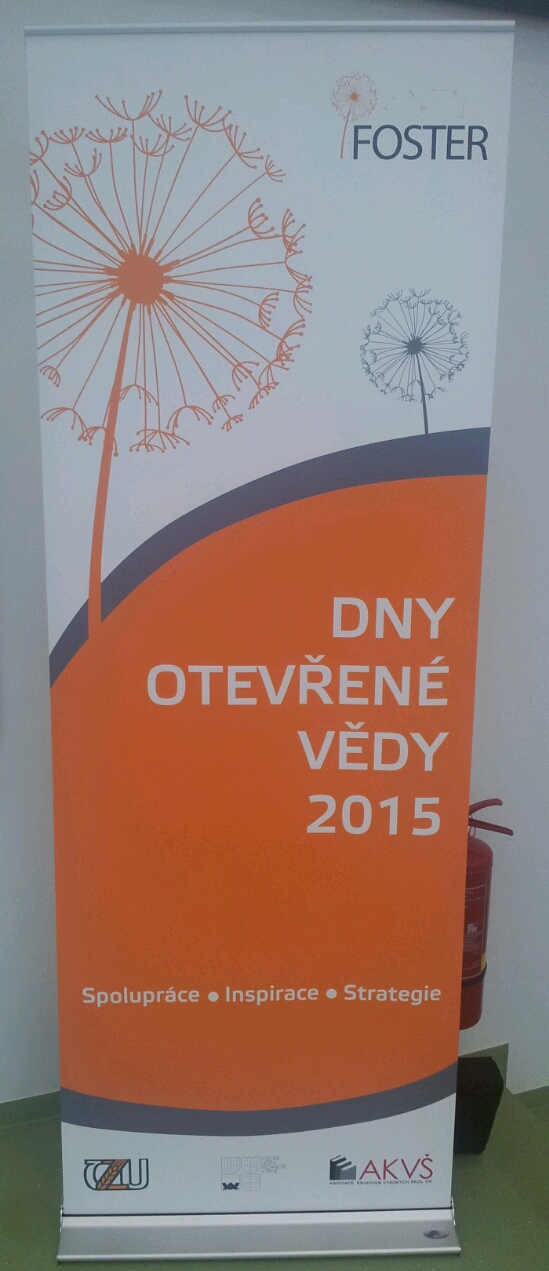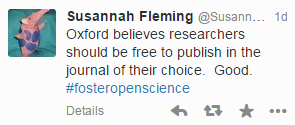Bumper week of FOSTER events
 It has been a busy week for FOSTER open science events! David Ball and I have been in the Czech Republic speaking at open science days in Prague and Brno. Martin Donnelly spoke at the 2020 vision event in Oxford, and Joy Davidson is involved in a workshop in collaboration with UNESCO on open science for doctoral schools.
It has been a busy week for FOSTER open science events! David Ball and I have been in the Czech Republic speaking at open science days in Prague and Brno. Martin Donnelly spoke at the 2020 vision event in Oxford, and Joy Davidson is involved in a workshop in collaboration with UNESCO on open science for doctoral schools.
The Czech events have been well represented with speakers from current EC projects, including PASTEUR4OA, OpenAIRE and naturally FOSTER. It’s still early days in terms of open access in the Czech Republic. Several universities have publications repositories (usually based on DSpace) but there are few mandates and uptake is slow. The notion of sharing data openly is a big leap and seems a long way off. It was interesting discussing researchers’ attitudes over dinner. Some of the concerns about sharing are the same as elsewhere, but Jan explained there’s a more deep-seated resistance due to historical events. Being open could bring you into conflict with authority so it will take a lot more advocacy than in other contexts to convince researchers of the benefits.
I’ve found that the starting point of openness can be problematic in training events as some attendees immediately switch off if they don’t feel it applies to them and their data. I think this is a concern for FOSTER and the EC’s Open Data Pilot. More perhaps needs to be made of the benefits of data management per se, with open data sharing being one potential outcome where applicable. Even if data can’t be made openly available, they should still be managed. That message needs to come across more strongly.
David Ball gave an introduction to open access and reflected on studies conducted by PASTEUR4OA and FOSTER. One of these studies showed that the vast quantity of published articles (over 75%) are not deposited at all, but deposit rates are over four times higher for institutions with a mandatory policy. So there is clearly a benefit to having an open access policy. David recommended that policies insist on deposit once papers are accepted for publication and link deposit with research evaluation as these criteria are the most effective.
Two key themes to emerge in discussion were the need for advocacy and concerns about open access limiting the choice of where to deposit. When thinking about how best to communicate open access, David recommended avoiding standalone events. Embedding messages into faculty away days, researcher-led events, or meetings that senior management will already be at is preferable. Given the concerns about data sharing, the need for advocacy from research champions and persuasive examples that demonstrate the benefits to be gained will be essential in the Czech context.
Jana Kratěnová from the Technology Centre of the Academy of Sciences spoke about the Horizon 2020 requirements in more detail. She reflected on the tension between what funders requires and what publishers allow. The EC requirements mandate open access and expect publications to be shared within 6 or 12 months depending on the discipline. Some people are concerned about such policies restricting the choice of publisher, for example if researchers want to publish in a high-impact journal that doesn’t offer ‘gold’ options or allow self-archiving in the required timeframes. From the twitter stream it sounds like similar concerns were raised at the Oxford event too.
It was interesting to learn more about the open access position in the Czech Republic. Hana, Petra and their colleagues were excellent hosts. We had time to enjoy a wander around the old towns and were told about the local history. We also sampled the excellent wine and beer brewed at the Czech University of Life Sciences. Very tasty!
Find the original blog post here: http://www.dcc.ac.uk/blog/bumper-week-foster-events
 Unless otherwise stated, all materials created by the FOSTER consortium are licensed under a CREATIVE COMMONS
ATTRIBUTION 4.0 INTERNATIONAL LICENSE.
Unless otherwise stated, all materials created by the FOSTER consortium are licensed under a CREATIVE COMMONS
ATTRIBUTION 4.0 INTERNATIONAL LICENSE.
 This project has received funding from the European Union’s Seventh Framework Programme for research,
technological development and demonstration under grant agreement no 612425.
This project has received funding from the European Union’s Seventh Framework Programme for research,
technological development and demonstration under grant agreement no 612425.